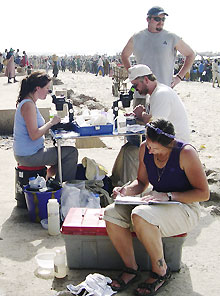Alumna’s Gift Benefits Students Studying Parasitology
 |
|
Janine Caira, foreground, a professor of ecology & evolutionary biology,
and other UConn researchers study parasites on a beach in Senegal.
|
|
Photo by Kristen Jensen |
A chance encounter between two scientists from UConn – an alumna and a faculty member – has led to a thriving philanthropic relationship that has allowed students to take part in fieldwork around the globe.
Janine Caira, a professor of ecology and evolutionary biology, was just finishing her Ph.D. in parasitology at the University of Nebraska in 1984 and was visiting the National Parasite Collection in Beltsville, Md., when she struck up a conversation with a woman whose desk was next to the copying machine.
“She asked, ‘What are you going to do in the fall?’ and I told her that I had just accepted a job in parasitology at the University of Connecticut,” Caira recalls.
Caira was taking over a position previously held by the late Lawrence Penner, who, it turns out, had taught parasitology to Judith H. Shaw, ’48, the woman next to the copying machine who was at work on a catalogue of parasites.
Both women share a sense of excitement at discovering new species of parasites. That interest led, several years after their meeting, to Shaw establishing the Judith Humphrey Shaw Parasitology Fund at UConn, an endowment that has enabled Caira to take students all over the tropical belt of the world in search of new species of both tapeworms and the sharks and stingrays that host them.
In January, Caira and her research team of six spent two weeks in fishing villages on the southern coast of Senegal, along with three Senegalese collaborators, surveying tapeworms that live inside the sharks and stingrays there. Two of the team, which was made up of students and graduates of Caira’s research group, owed their participation to the Shaw endowment.
“Senegal was amazing. It was like a positive culture shock,” says Joseph Mega, a fifth year pre-med honors student who was a member of the field team. It was his first scientific fieldwork and his first trip to Africa, where he hopes one day to practice medicine.
“Africa was a really intense place,” he says. “This was good preparation.”
Although still an undergraduate, Mega has spoken at national and regional research meetings, and has just submitted a research paper with Caira to the International Journal of Parasitology. For three years before going to Senegal, he had seen parasites and hosts only from the perspective of Caira’s laboratory in the Torrey Life Sciences Building.
Carrie Fyler, a second-year Ph.D. student, chose UConn for graduate school because of the opportunity to do fieldwork and learn how parasites and their hosts have evolved together.
“It’s very important as a biologist to understand your organism,” she says. “You get a lot of information about the ecology of the parasite by collecting it yourself.”
In Senegal, the crew negotiated with local fishermen, who speak Wolof and other West African languages as well as French, to be allowed to gut their fresh-caught sharks and stingrays and obtain live tapeworm parasites. They set up microscopes on the beach to document, describe, and fix the tapeworms for DNA sequencing and other studies.
Caira has major research grants from the National Science Foundation, but the support of the Shaw endowment is invaluable, she says: “In all of our projects we get a lot more done because we can involve undergraduates.”
She has taken crews to Senegal four times and hopes to go back. She has an active field program underway in Borneo, too, where her group has identified as many as eight new species of sharks and rays as well as new parasites.
“It’s expensive if I want to bring a team. [If not for the fund,] I don’t know how else we’d do it,” Caira says.
Caira has shared her group’s discoveries in letters and e-mails to Shaw, who is now retired.
“Because she knows about parasitology, it’s easy to keep her informed,” Caira says.
Caira values Shaw’s gift so much that when she received the Distinguished Alumni Professorship Award last year for research, service, and teaching, she donated the proceeds of the award to the Shaw endowment.
She recently wrote to Shaw: “I know I sound like a broken record, but I would not be able to do this without your fund.”

